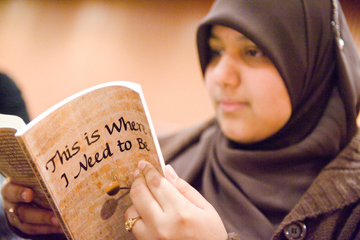The New SPI: Crossing Borders and Disciplines
They may not be ready to sign with Def Jam Recordings, but tenth graders at the New York City Lab School for Collaborative Studies in Manhattan rapped their way to preparation for the chemistry Regents exam this spring. The students recorded and published a rap study guide to chemistry as participants in the Student Press Initiative (SPI), a writing and publishing program for middle and high school students based at Teachers College, that also has helped boost students' scores on standardized tests.
Starting off with matter and energy
Makes up everything in this galaxy
D equals M over V find the density”
They may not be ready to sign with Def Jam Recordings, but tenth graders at the New York City Lab School for Collaborative Studies in Manhattan rapped their way to preparation for the chemistry Regents exam this spring. The students recorded and published a rap study guide to chemistry as participants in the Student Press Initiative (SPI), a writing and publishing program for middle and high school students based at Teachers College, that also has helped boost students’ scores on standardized tests.
Other SPI efforts in New York City schools this year included This is Where I Need to Be: Oral Histories of Muslim Youth in NYC; a tap dance project that responds to the many rhythmic sounds on the streets of New York; oral histories of community leaders and activists, full-color graphs illustrating math problems and solutions, and an urban Farmers Almanac for high schoolers.
The anthology evolved from a realization that, from Kosovar Albanians to new Latino converts, New York City has the most diverse Muslim community outside of Mecca during the annual week of Hajj (when hundreds of thousands of pilgrims simultaneously converge and perform a series of rituals). The book’s 12 pieces were written by Muslims in New York City high schools, each of whom had interviewed a peer about what it’s like growing up (or becoming) Muslim in post-9/11 New York.
With guidance from SPI director Erick Gordon, project advisor Kerry McKibbin, and teachers Nisrin Elamin, Ann Hawley and Amina Tawasil, the students navigated the exhaustive interviewing, writing, editing, and publishing processes that go into producing an SPI anthology. The result: sympathetic, nuanced portraits that range from a budding fashion designer to a new convert trying to make her Jewish family understand her views.
SPI has been working in schools since 2004, taking teachers and students through the rigorous process of exploration, discussion, creation and revision that culminates in published work. Every student, regardless of his or her interest or talent, publishes something. Most have produced books of essays or nonfiction writing, but others have stretched the definition of “publication” to include CDs, videos or films, music or dance compositions. This year, SPI also became a curriculum consultant in 12 schools and employed the SPI model to prepare students for high-stakes, standardized tests.
SPI is based on the premise that students learn best when they are engaged in a creative process and can respond, in their own voices, to things in their own world that are important to them. Says Gordon of the Muslim students: “They endeavored to capture genuine pieces of everyday moments—some perfectly ordinary, some poignant, others aggravating—in the lives of fellow teenagers for whom ‘looking Muslim’ can scare up a suspicious gaze or a look of disdain.”
In one of the pieces, new convert Danielle Benson talks about how she learned to love the hijab—a traditional head-covering of Muslims—even before her conversion. “It feels wonderful to understand the principle of modesty,” she said. “When I went to Israel, I wore hijab for one day, and I had little kids screaming and running away from me in the bathroom.”
A student who asked to be known only as “Hussein” said he wanted to be a journalist when he grew up. “I love the people who work for the BBC and Al Jezeera, who go to conflict zones and put themselves in dangerous situations just to report the news to everybody else. I think that is really honorable.”
The student authors said that not only did the project teach them new things about publishing, it also taught them about the variety found in the New York Islamic community. As one of the authors, Rahimah Ahmad, put it, “I’ve learned it wasn’t just about getting the stories; it was about hearing them too.” •
The full text of Where I Need to Be can be viewed at www.lulu.com/content/2456135.
Published Monday, Jul. 14, 2008
